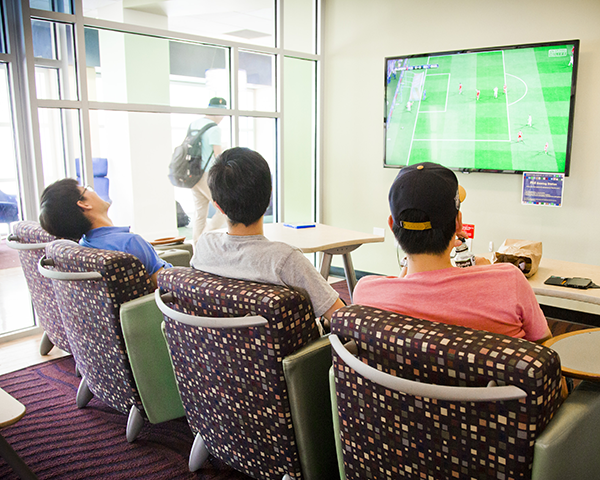
[Ed. note: This article was written by Haynes Chewning and Tara McCurley.]
Gaming is an increasingly important topic in higher education. In the past few years, there have been classes built around specific games or aspects of gaming, as well as existing courses modified to accommodate gaming components. LITS Student Services embraced gaming and hosted the first history of gaming course in Cox in Spring 2012. Our team also provided the use of an Xbox 360, PS3, and a couple of Nintendo Wiis.
In the Fall 2013 semester, however, we decided to try something new by introducing regular recreational gaming at the Computing Center at Cox Hall. First, some background: the previous summer, we installed four flat screen televisions throughout Cox to facilitate small group collaboration with a multitude of devices. Despite our best efforts to make the screens user-friendly and to publicize the technology, the screens just didn’t seem to get much use. We began tracking screen usage systematically in Fall 2013 only to confirm the near-zero use we suspected, finding that on average each of our four screens was in use less than 20 minutes per day.
Student Services Manager Tony Shiver suggested we take a different approach. While on tours of libraries and other labs, he had noticed the same unused collaboration screens next to far more dynamic gaming spaces. Given the rise of gaming research and design, and the popularity of public gaming spaces at other universities, it made sense for Student Services to begin providing spaces for gaming and gauging their popularity at Emory.
We turned “Grape,” one of our collaboration spaces at Cox Hall, into an Xbox One gaming station. We provided four controllers and several games available for checkout at our service desk. Since we put the Xbox at Grape, we’ve seen that screen’s usage skyrocket to an average of 3 hours and 40 minutes per day, even reaching as high as 9 hours of use in a single day. With this success, we recently decided to add a PS4 to “Lime,” our most underutilized screen. Lime’s use saw an even bigger increase, going from an average of only 7 minutes a day to 3 hours and 43 minutes and hitting a high of 10 hours of use in a single day.
With this early venture into gaming, we’ve already learned a few things about supporting gaming consoles:
- Noise isn’t nearly as bad an issue as we anticipated. Most groups realize they’re in a public space and naturally keep it down. Rowdier groups are usually happy to lower their volumes with a single request from the staff.
- Non-gamers will sometimes sleep in the gaming area and make it awkward to use the space.
- The discs must be kept clean so the consoles can read them. It’s been our biggest problem actually, and if you ask Cox student staff about the Xbox, they’ll likely roll their eyes and say the discs don’t play. We solved, or at least mitigated, the problem by keeping disc cleaning supplies at the service desk.
- We need to have at least four user accounts with adult privileges and saved passwords for players who don’t want to sign in as themselves. We set up the Xbox One with some child accounts that have caused us problems because games like NBA2K14 require an adult passcode to play. All accounts on the PS4 have adult privileges.
- Players can have up to four wired headphones in use at the same time with one console if you connect a headphone amplifier to the console’s optical audio output.
- Microsoft’s customer service for the Xbox is, um, challenging.
- It’s important to play with the consoles to learn their quirks. To highlight, we’ve learned PS4 controllers must be manually disconnected at the end of play and that NBA2K14 requires multiple players to log in from the home screen before launching the game.

While this first foray into public support of a gaming console allowed us to figure out a lot of the basics on our own, we didn’t have historical support knowledge, or a clearly defined path towards future expansion that may include the addition of PCs, additional consoles, networking, etc. To learn more about gaming support, Robin Horton and Haynes Chewning visited Battle & Brew in Marietta. B&B, in addition to being a bar and eating establishment, has a number of PC workstations and a handful of HDTVs to cater to console gamers. Rather than attempting to reinvent the wheel, they met with the owner and others there to learn about their successes in providing and supporting gaming platforms in a heavy-use environment.
Certain important points they made were:
- Avoid felt-covered microphones because they will smell and require regular cleaning.
- Avoid cheap mice and keyboards; pay for a known brand with high quality products.
- Have extra peripherals for when internal batteries need charging or something breaks.
- Avoid wireless headsets on consoles because typically only one is supported and they require additional setup each time they’re used.
Some of the knowledge we gained has already been implemented, while much of it will be useful in the future. Next steps for us are to further enhance existing gaming stations, including refining use policies, finding ways to further gauge customer satisfaction and collect feedback, and implementing policies and procedures for expanding our game collection. Longer-term plans include creating gaming research spaces and hosting gaming events to attract more users to our facilities (perhaps also exposing them to other services we offer). Gaming looks like it will be a popular service at Emory and our team is committed to providing a quality experience and expanding it in the future.
To keep track of how we expand this exciting service in the future, visit http://it.emory.edu/studentservices/services/gaming/index.html.

Leave a Reply